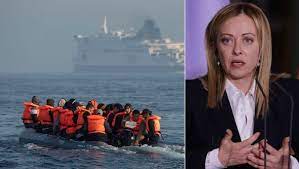EU fails to agree changes to migration laws as Germany and Italy clash

Brussels: European Union member states have failed to reach an agreement on changes to the bloc’s migration laws after Germany and Italy clashed over key proposals relating to human rights guarantees in detention centres and the role of NGOs in facilitating migrant arrivals.
But, as hopes faded on Thursday of a deal being struck, ministers said they expected “fine tuning” in coming days to lead to a pact that would apply in the event of a sudden refugee crisis such as that of 2015 when more than 1 million people arrived from Syria and beyond.
Earlier this year the 27-member bloc agreed its first batch of changes to allow for the relocation of migrants across Europe and fines of €20,000 (£17,000) a head for countries that refused to take their allocated share.
Thursday’s summit of interior ministers in Brussels was about the rules that apply when a migrant first arrives on the external border of the EU. It came amid a rise in the number of people arriving in Italy from Tunisia and but also increased arrivals the Greek islands of Samos and Lesbos, the EU said.
The summit started with cautious optimism after the German chancellor, Olaf Scholz, said he would not block a deal. “The government also agrees that it will not be Germany’s fault if the last building block of the entire work is not launched for negotiations,” said Scholz in Berlin.
The European Commission’s vice-president, Margaritis Schinas, urged member states to get the text over the line, telling ministers that a unified plan would be a means of fighting back against a rising tide of populist politics: “If this is the case we will finally deprive the demagogues and populists in Europe who are still claiming we are not able to sort out the situation,” he said.
But later in the day it emerged the Italians said they could not support a revised text and the draft legislation did not go to a vote.
The disagreement is said to have centred on two issues. Sources say Germany objected to a new clause, supported by Italy, that would allow minimum standards in detention centres to be breached in exceptional circumstances.
It is understood that Italy’s far-right government objected to a clause, which Germany supported, in relation to migrants assisted by NGOs to reach an EU country. Giorgia Meloni, the Italian prime minister, was reported to have expressed her “astonishment” to Scholz earlier this week at the news that Germany was funding charities to rescue people in the Mediterranean sea.
The Spanish interior minister, Fernando Grande-Marlaska, said that despite the setback the member states were “very close” to reaching the agreement with sources confirming a deal was likely before an EU leaders summit in Spain next week. “There is a very broad majority of member states which agree,” he said.
“We can be optimistic there are some points of details that need to be fine tuned, and we hope in the next few days we can announce a general approach in relation to the crisis regulation.
The aim of the changes is to provide clarity on asylum procedures, rules around screening processes, border registrations and the creation of a relocation or “solidarity” package to relieve frontline states such as Italy and Greece of the total responsibility to process migrants.
“If we don’t finalise this work we will still see deaths and misery in the Mediterranean,” said Nancy Faeser, the German interior minister.
Ylva Johansson, the European commissioner for home affairs, said the EU had so far this year received more than 250,000 “irregular arrivals,” an increase in numbers mainly seen by Italy and the island of Lampedusa.
But she added that the EU had at the same time a backlog of 600,000 asylum applications. “That shows our challenge is much bigger than the prevention of irregular arrivals,” she said.
Interior ministers agreed to extend the temporary protection for the estimated 4 million Ukrainian refugees who are residing in Europe until March 2025.





